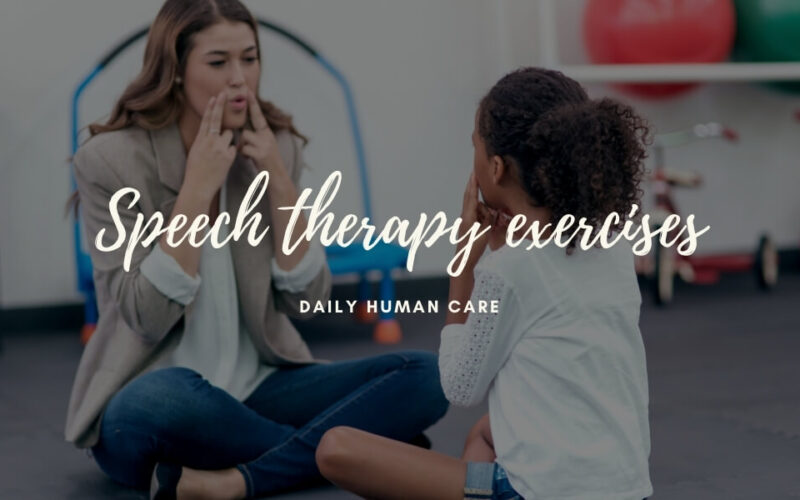In this article, Daily Human Care will tell you about speech therapy exercises for toddlers, adults, and stroke patients that you can take up at home.
Table of Contents
What Is Speech Therapy?
Speech therapy is a linguistic procedure that aims to improve a child’s speech, distinguish his speech, and overcome problems such as poor articulation, impaired fluency (sound, word, or phrase repetition), and phonological and vocal disorders.
What are the three basic types of speech impairments?
There are three fundamental categories of speech deficiencies: articulation disorders, fluency disorders, and voice disorders.

Speech therapy exercise for toddlers:
1. Speech Therapy Exercises: Flashcards and question card
Please put your child on a few flashcards with photographs to tell them what they see on the card. Start your journey with a few cards and increase photos. If your child is struggling with certain words, you will understand where more time is needed.
Question cards have children’s easy questions. Choose one card at a time and slow down to talk. This can be an excellent technique for your child to speak.
The questions might be, “What would it be if you had one present right now?? “/ “What would it be if you could change anything about school?”
2. Speech Therapy Exercises: Mirror exercise
Visual input from mirrors. Many kids with articulation disorders don’t know how to make sounds correctly with their mouths. Speaking before a mirror allows a child to watch their mouth move as they make a specific sound.
Stand before the mirror and make every sound for your infant. Help them then understand the variations in the mirror.
3. Speech Therapy Exercises: Hop and speak
Your child will repeat the word nine times in this game. Start your words by practicing with your boy.
Draw the 1-9 number hopscotch and ask the child to talk each and every time the child hops. When they’re 9, change the word and make them jump again with a different word this time.
You can start with fewer words and gradually increase them.
When they have finished the game, reward them with a present for saying the words correctly. This strengthens the child’s confidence.
4. Speech Therapy Exercises: Play catch
Take a ball and throw it to and fro. Play catch while you practice your words with your kid. They do two exercises at a time in this way.
5. Speech Therapy Exercises: Go for a walk
If you walk with your child somewhere, take him one step forward for each correct repeat. If you’re at a park or enter your building, you can try that.
You can also use toys for effective speech therapy. Here are 15+ speech therapy toys for your child for effective speech therapy
Speech Therapy Exercises for Stroke Patients
See the speech therapy exercises for stroke Patients by clicking here.
What is speech therapy for Adults?
The aim of speech therapy for older people is to enhance functional communication, cognitive skills, and facilitate healthy swallowing by incorporating dietary changes and unique feeding methods. The speech therapy services of ASC can involve muscle retraining, countervailing policies, and the use of communication devices.
Speech Therapy Exercises for Adults In communication
Many older people, especially those suffering from strokes, need to be spoken and spoken. You can also offer your parent speech therapy alone if your elder’s insurance does not pay for a speech therapist because you cannot afford it to you.
The first step in speech therapy is to enhance mouth and tongue dexterity. The following oral motor exercises, ten times each and repeated each day in a second batch, will boost speech capacity:
- Press the tongue.
2. Extend the tongue straight out.
3. Extend the tongue down to the chin.
4. Extend the tongue up to the nose.
5. Extend the tongue to each corner of the lips.
6. Push the lips to one side, and then to the other side, as though shaving.
7. Pucker the lips.
8. Smile broadly.
9. Pucker the lips and then smile broadly in quick succession.
10. Say “ba-ba-ba-ba-ba.”
11. Say “pa-pa-pa-pa-pa.”
12. Say “ca-ca-ca-ca-ca.”
13. Say “ta-ta-ta-ta-ta.”
14. Say “ma-ma-ma-ma-ma.”
15. Say “pa-ta-ca-pa-ta-ca.”
The second step is to increase cognitive language skills in speech therapy. Although a stroke has destroyed the brain’s language center, neurons will still establish new links and reparations by conducting the elderly in various language training.
You can render these exercises with artifacts and souvenirs in the home of your parent. Get old photo albums out and turn your elderly pages, ask who is in the prints, and discuss the times. Check around the house for old trophies, diplomas, arts and crafts, military medals, and others of value in the life of the elderly. You can use them as a starting point for the talks and help the elder reconnect and redevelop a sense of the universe.
Many elders can still compose, even those with strokes. Place your senior man’s style and paper before him, ask for a reminder or text. Again, it doesn’t have to be okay.
Sitting down and reading the newspaper with them is another perfect way to make seniors more relaxed. You can read the article, point out the images, speak about the stories, and ask what your parent thinks when your senior cannot read actively.
Elders who have total or limited dementia and who speak lots of gibberish can still talk, even though you can’t understand them forever.
What is important to note is that older people with communication issues still have people and things to say. Talking to them is the best way to respect this essential part of what it means to be a person.
Also read, Speech therapy for Adults
What causes speech problems in adults?
It is usually caused by an injury that damages speech-related parts of the brain. Prevalent causes may be Stroke or Head injury traumatic.

